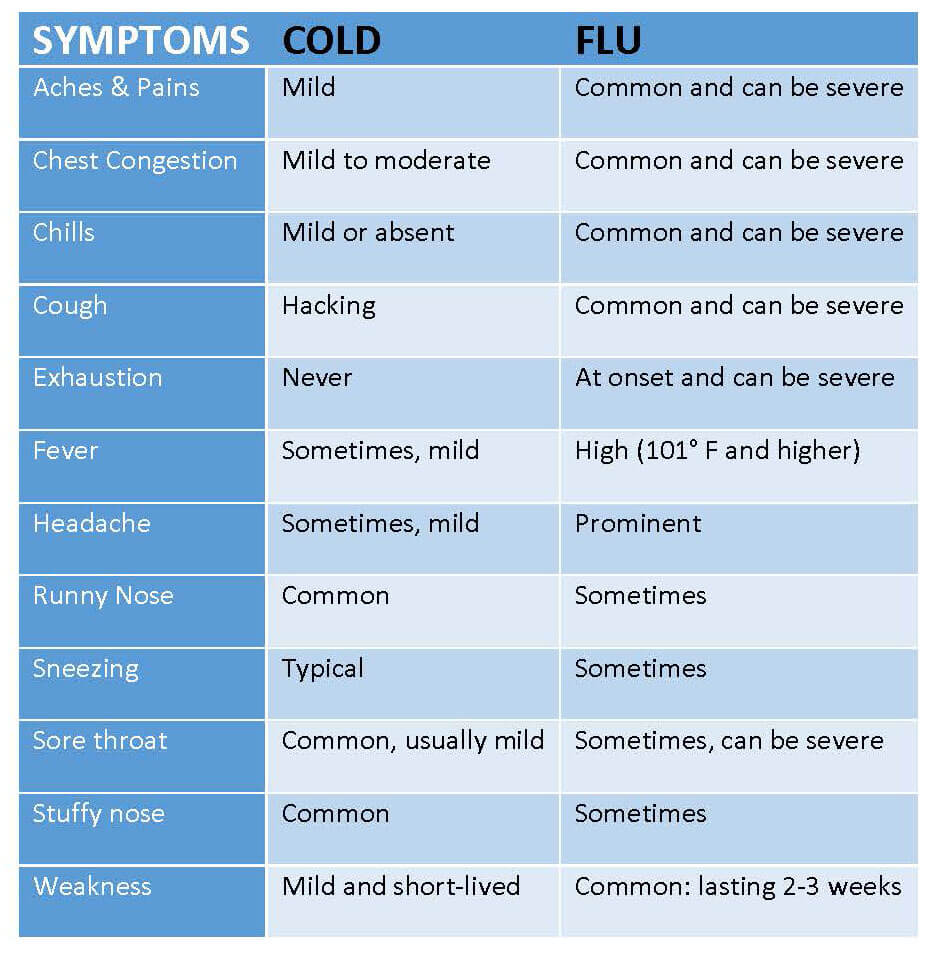Should You Get A Flu Shot Now?
The 2019-2020 flu season is here, and EU and US health authorities predict a busy one. You may recall that 2017 was one of the worst flu seasons in decades and that 2018 was quieter. That’s because seasonal influenza is cyclic. It comes every year but varies in strength. What's happening this time?
| | Reading Time: 8 minutes

The annual flu season runs from October through March in the Northern Hemisphere, though it could start earlier and last longer. In the Southern Hemisphere, it’s the opposite. So I look to Australia during July-August (our summer, and their winter) for clues of how bad our flu season might get, and how effective the flu shot was.
The Australian Department of Health estimated that this year’s vaccine was 40-60 percent effective. That’s better than the last two years, and far better than the 2004-2005 flu season when the vaccine was only 10 percent effective. But, hospital admissions in Australia for the flu were higher than in 2018, a mild influenza year.
Next, I look to the Europe. According to Flu News Europe, influenza intensity and infection rates were low during the first week in October in Eastern Europe. But Western Europe isn’t taking chances and preparing for the worst. In the most extensive ever vaccine campaign, the UK is pushing the flu jab.
In North America, so far, Canadian influenza activity remains low with some regions with no flu activity at all. And reported flu cases in the US are fewer than average. But, that’s normal for late summer and early fall.
A mild start is not an indicator of how bad winter flu might get. When November and December approach, the curve goes up steeply with peak cases coming in January through April
Does Everyone Get The Flu Each Year?
About everybody will get the flu several times during their lifetime, but not everyone gets sick annually. On average, adults get flu-like illnesses 2-3 times each season. Though some don’t get it at all. Often, people catch a terrible cold and think they have the flu. That’s because colds and the flu have similar symptoms.

Symptons comparison between Flu and Cold
Cold Versus Flu
Where you live matters too: if you live in the crowded Northeast corridor from Washington DC to Boston, expect to catch the flu in late October or November.
Does Everyone Get Sick From The Flu?
If you get infected, you’ll get sick. But how sick you get depends on the circulating strain of influenza and your immune system’s response. A 2015 study calculated adult immune response and estimated flu frequency found adults, on average, get influenza twice per decade. And, because of immature immunity against the flu, children contract the virus every other year. The researchers guessed that the frequency of infection was a mix of age, exposure, and individual immunity based on past infections and vaccination.
Non-influenza viruses cause most flu-like upper respiratory infections. The only way to know if you have the flu is to get a blood test for influenza A and B antibodies plus Real-time PCR.
The Case For and Against Vaccination
Because there are few effective anti-influenza drugs, vaccination is the primary treatment against the flu virus. But, there’s a big difference between vaccines against measles, for example, and the one for influenza.
Lifelong natural immunity occurs when children catch measles or get immunized. Because there are so many types and subtypes of influenza viruses—and these mutate fast—getting sick in November doesn’t guarantee immunity against catching the flu in February or next December.
8 Concerns Against Getting a Flu Shot:
- Safety
- Allergic reactions
- Low effectiveness
- Waning protection
- Contamination
- Conflict with statin drugs
- Immune deficiency
- Consequences of annual shots over decades
Are Flu Shots Safe?
Based on my understanding of the research and years of clinical experience, I believe influenza vaccines are generally safe. But do they work well enough to justify annual vaccination? And does getting one every year imbalance your natural immunity?
Inactivated influenza vaccines are the most common type of flu shot. In a 2018 paper, public health experts regarded influenza vaccination safe for children over six months of age to the elderly.
Can The Flu Shot Trigger An Allergy?
The CDC advises people with a history of a severe allergy to eggs to get a shot without egg proteins. That’s because seasonal inactivated and pandemic influenza vaccines are incubated in chicken eggs, and people with a severe egg allergy could react badly. Discuss this with your doctor or pharmacist if you have an allergy to eggs. And, consider getting an allergy test for eggs if you suspect sensitivity.
Are All Flu Shots The Same?
There’s no universal flu shot. Which of the three options should you get? The inactivated vaccine, the recombinant vaccine, or the live attenuated nasal mist? Should you get the trivalent (3-component) or quadrivalent (4-components)?
You can get your vaccine by injection or through a nasal mist. Which one is best for you? That’s easy, the shot works best. Will one do, or is two better? Who gets the high dose shot?
Fluzone is a trivalent inactivated vaccine four times stronger than the standard shot. It’s for people over 65 years who have a weak or little immune response from the regular jab. But there are no studies that prove it’s any better than the regular shot. And, people get more reactions after a Fluzone shot. I don’t recommend Fluzone for generally healthy people of any age.
The only non-injected influenza vaccine is FluMist, and its effectiveness is low. According to the American Academy of Pediatrics, this year’s nasal spray vaccine is better and safe for children. If you have young children, discuss this option with your pediatrician. I don’t recommend the nasal spray vaccine for adults.
On the CDC website, you’ll find the recommendation that everyone over six months of age get an annual flu vaccine, but leave the choice of type and delivery system up to you or your doctor.
Are Flu Shots Effective?
Influenza vaccine effectiveness varies from year to year. It’s been as low as 10 percent in 2004-2005 and as high as 60 percent last year. But, compared to the yellow fever vaccine that is 99 percent effective and the MMR vaccine that is 97 percent effective and only requires one childhood vaccination, the influenza vaccine is a failure.
What’s The Concern With Statins?
If you take a cholesterol-lowering statin drug, the influenza vaccine may not work. Statins can undermine the immune response to the vaccine making it infective. Researchers have followed this concern closely because over 35 million Americans take statins. However, a 2019 survey found no reduction in flu vaccine effectiveness in over 3,000 people followed. I don’t believe this one paper is the final answer on how statins influence viral immunity. But for now, it’s safe to get a flu shot if you take a statin, but don’t count on it working.
Does The Flu Shot Work For People With Compromised Immunity?
What about those with an immune deficiency disorder or patients taking immunosuppressant drugs? The American Academy of Allergy Asthma & Immunology advises patients with immune deficiencies and their family or household members not get the live attenuated influenza nasal mist vaccine.
Delay getting a flu shot if you’re taking a corticosteroid like prednisone to suppress inflammation. Steroids dampen the immune response and can interfere with the effectiveness of the influenza vaccine.
Those with compromised immunity and patients taking immunosuppressant drugs for an autoimmune condition are at higher risk for severe lung infections from influenza, so they may get some protection if they get a flu shot. Or, the vaccine might not work at all.
The Risk Of Annual Vaccination
My main concern is getting annual flu shots over a lifetime. Repeated yearly vaccination against influenza can make you more likely to get the flu. in a 2018 paper, researchers termed this effect “negative interference.” In some people, the response falls off.
Conflict of Financial Interest
Then there’s the question of profit. Big pharma companies gain about $3 billion a year on flu shots that cost between $5-18 million to make. That’s a considerable motive for selling more flu shots. In a Wired magazine interview with Michael Osterholm Ph.D., a well-known public health scientist and founder of the University of Minnesota’s Center for Infectious Disease Research and Policy (CIDRAP), pointed out that this economic model works against the innovation needed to find a better solution for beating the flu.
6 Reasons For Getting a Flu Shot:
- Reduces the risk of children dying from influenza infection.
- May reduce the severity of infection.
- Might minimize your missed work sick days.
- Lowers your chance of getting hospitalized for flu-like respiratory complications if you get the flu.
- Patients with cardiovascular disease are less likely to have a heart attack or stroke during influenza sickness.
- Can protect mother and fetus during pregnancy from severe influenza infection.
The reasons for an annual flu shot are covered extensively elsewhere. You can read these accounts online, talk with a local pharmacist, or discuss any concerns with your doctor.
When To Get Your Shot?
Every fall, my patients ask if they should get a flu shot. If you’re going to have a flu shot, the CDC recommends getting one in late October. That way you’re prepared for an early peak. By December, those who don’t get vaccinated ask if it’s too late. That depends on the influenza season.
If you follow FluView, or my Twitter feed, you could time your shot for later. The reason is the flu vaccine’s efficacy tapers off becoming 7-16% weaker every month from the time you got the jab. So, if there’s a late peak, say in March, you may need another shot to protect against an influenza surge in late April. If there was an early peak, a December or January flu shot is too late. But, if the peak comes in February or March, you’re right on time with a flu shot in the end of December or beginning of January.
Remember, it takes about two weeks for the vaccine to reach its full efficacy, so if you’re going to get one, don’t wait until everyone’s sick during the seasonal peak.
My View On Annual Flu Vaccination
As the author of two books on viruses (Viral Immunity and Beating the Flu) and many blogs and articles on influenza, I’m considered an expert on treating viral infections with natural medicine. True, I have four decades of clinical experience. But the answer is complicated.
- Viruses are cunning complex organisms that defy treatment, including natural therapies.
- The influenza vaccine is far from perfect, but it’s safe for most people. And it’s the only shot we have against the flu.
- It’s effectiveness varies over time, your age, and whether the vaccine is well-matched each season, if a pandemic influenza is looming, and your immune status.
- Flu vaccines are nearly ineffective in older people even though they are among the most susceptible to dying from the consequences of influenza. However, I’m in favor of the pneumonia vaccine for those over 65 years because opportunistic pneumonia is often deadly when associated with getting the flu.
- Some states and cities are more susceptible. High population centers like Los Angeles and New York have more cases. If you live in these areas, you might want to get a flu shot.
I believe current flu vaccines are safe and somewhat effective, sometimes. The research is sound, and influenza health authorities are professionals who take their work seriously. During a severe flu season or impending influenza pandemic, a flu shot could provide some protection and even save your life. However, I’m not convinced that getting a marginally effective flu shot every year is useful, safe in all cases, or wise.
In this blog, I tried try to clear up the confusion about influenza vaccination, add a few thoughtful questions, and provide guidelines for you to make your own decision.
Given the number of variables, wouldn’t it be better to keep your immune system resilient? And, no drug or vaccine, or herb is better than prevention. Be proactive about flu avoidance from October through March.
A wiser approach is to get a flu shot based on your individual needs, lifestyle, exposure, age, the strength of the season or pandemic strain, and your health status. It’s better to prepare at home and work with proven strategies to beat the flu.
TO LEARN MORE:
- Follow your local newspaper’s online health updates. As examples, here are the Tampa Bay and San Francisco Chronicle
- Look at your state and city public health website. Here’s the Florida FLU REVIEW
- Follow the CDC’s FluView for weekly updates on flu activity across the US.
- Check Flu Near You for crowdsourced data on flu activity in your area.
- Follow me on Twitter where I post thoughtful, relevant, and timely articles and information on influenza and other viral illnesses.


